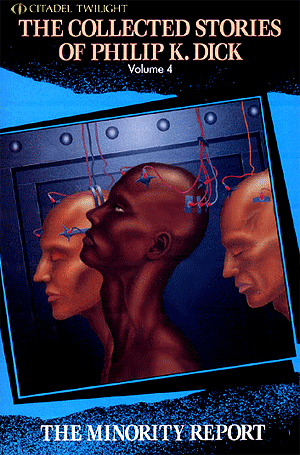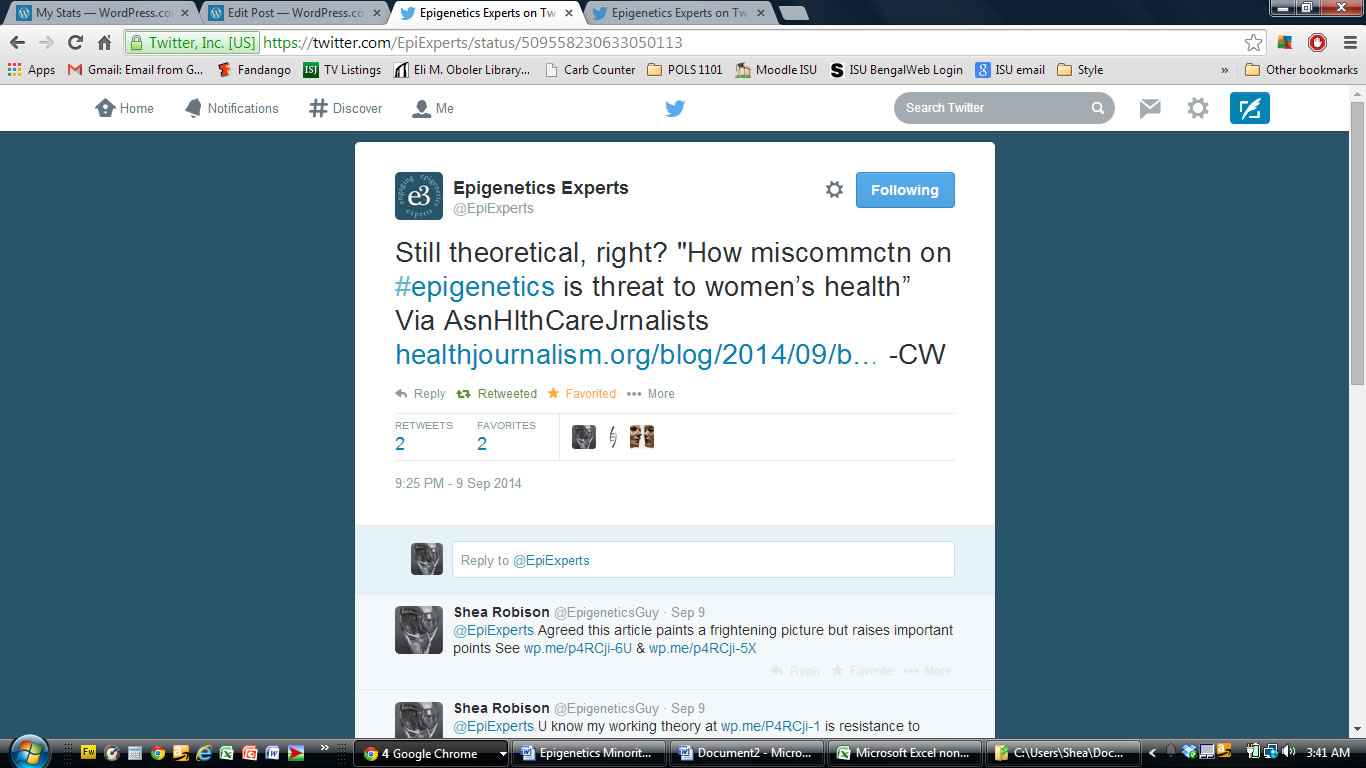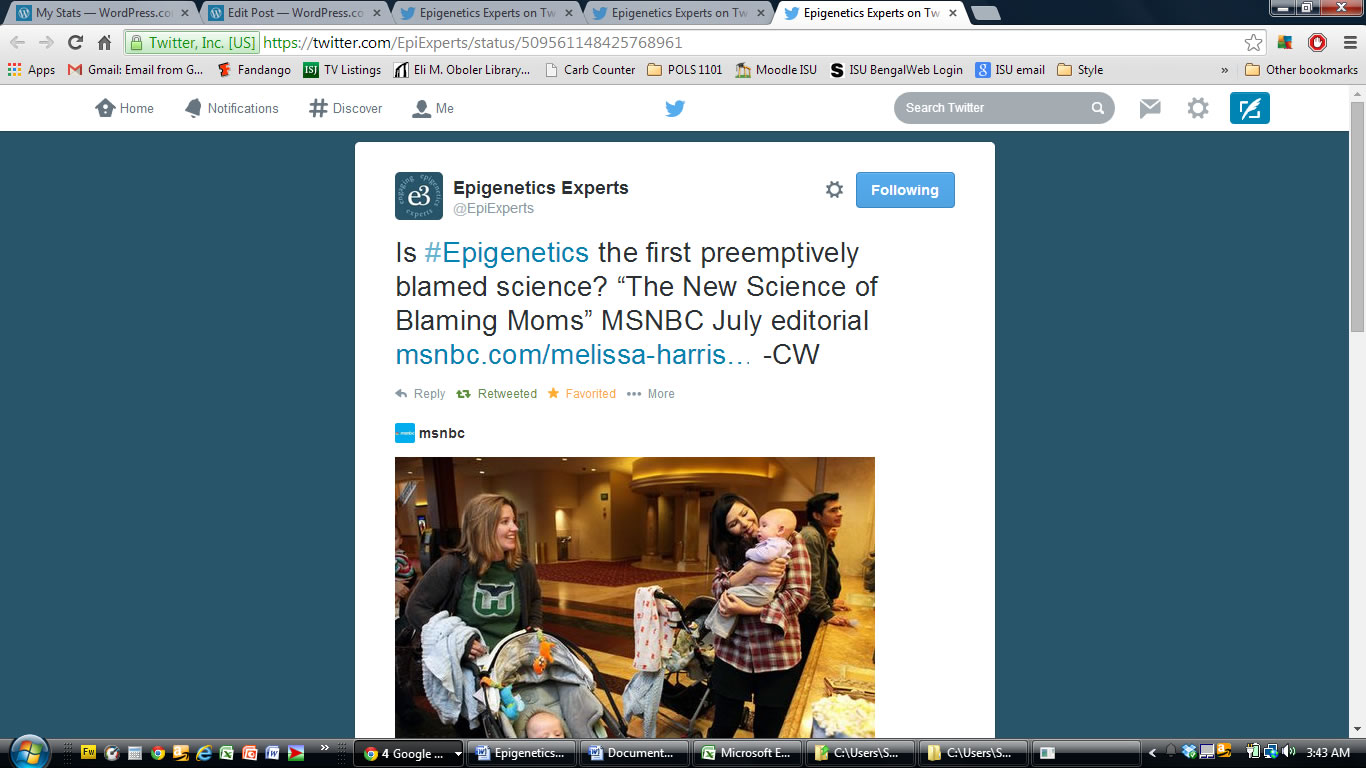September 12, 2014, by Brigitte Nerlich
Science, politics and epigenetics
 This post by Shea Robison is reposted here with the permission of author. Shea originally posted it on his blog ‘The nexus of epigenetics‘ under the title “Epigenetics Minority Report Part I: Epigenetics, blame, precrime and politics“
This post by Shea Robison is reposted here with the permission of author. Shea originally posted it on his blog ‘The nexus of epigenetics‘ under the title “Epigenetics Minority Report Part I: Epigenetics, blame, precrime and politics“
If you picked up the movie reference in the title to this post, you are likely (hopefully) asking yourself “Minority Report? And epigenetics? Really?” The answer to this question is “Yes…perhaps,” but while the reference is meant in fun, this connection between epigenetics and Minority Report raises some serious points for discussion.
(As you may or may not know, the Steven Spielberg movie Minority Report released in 2002 and starring Tom Cruise was actually an adaptation of a Phillip K. Dick short story The Minority Report from 1956. Dick was an eccentric—über-eccentric—author of science fiction who has had twelve of his stories and novels turned into movies, from the seminal sci-fi classic Bladerunner to the early ‘90s Schwarzenegger vehicle Total Recall to the laughable-but-can’t-look-away Paycheck starring Ben Affleck and Uma Thurman) In brief, the plot of the story and the movie center around Precrime, a system of law enforcement and criminal justice in which people are apprehended and punished for crimes they have not yet committed but which they would commit if not prevented. This foreknowledge of as yet uncommitted crimes is provided by three psychics called “precogs,” or precognitives, who through genetic mutations can see into the future. At the commencement of the story and the movie, this system has practically eliminated crime in society. In both the story and the movie the main character is a Precrime officer who intercepts a precognition that he is going to murder a man in the near future (in the movie, this is a man unknown to the officer). As a Precrime officer he knows he will soon be picked up by Precrime and imprisoned for the rest of his life for a crime he has not yet committed. The subsequent action of the plot is driven by the officer avoiding apprehension and trying to find out why the precogs foresaw him committing this most serious of crimes for which he does not yet feel any intent.
As with most stories about prediction of the future, this one also raises questions about free will versus determinism: If your future is predicted with accuracy, are you bound to fulfill this future? Or is there any latitude in the realization of this future? An additional aspect introduced The Minority Report regards the ethical issue of the justice of punishing someone for a crime they have not yet committed, but which they (probably) will—akin to the hackneyed question what would you do if you had a time machine and travelled back to post World War I Austria and encountered a struggling young artist named Adolph Hitler. Both of these aspects of this story are extraordinarily relevant to serious discussions of epigenetics.
Epigenetics and Precrime
What brought this comparison of Minority Report and epigenetics to mind for me was when @EpiExperts tweeted about a recent spate of articles about epigenetics which mentioned the potential for ‘mother blaming’ in reference to the results of research on epigenetic inheritance. @EpiExperts Tweeted links to two such stories:
“Blaming moms: How miscommunication on epigenetics is a threat to women’s health”
and “The New Science of Blaming Moms”
noting that these concerns about mother blaming are being voiced in the absence of any proof that any such attributions are actually being made by epigeneticists, and asking the question “Is #Epigenetics the first preemptively blamed science?”
This issue of preemptive punishment raised by @EpiExperts is applicable to epigenetics in a couple of important ways. First, there is this question of whether epigenetics itself is being judged for a ‘crime’ it has not yet committed (i.e., mother blaming in this instance).
In an ongoing conversation, @EpiExperts has posted links to still other articles about this mother blaming, again expressing concern and a little bewilderment that people—in particular non-epigeneticists—are somehow painting epigenetics with this particular brush For most people like @EpiExperts who are either working epigeneticists or somehow otherwise involved in the nuts and bolts of epigenetics, the science of epigenetics is the primary concern. For these practitioners, the validity of the scientific results is understandably the only reasonable standard by which epigenetics is and should be judged. The reality, though, is that the science is only one part of the equation of how and why scientific discoveries are disseminated and eventually accepted as legitimate.
Science, politics and narratives
Politics—both within and external to the practice of science—plays as significant a role as science in the acceptance of any scientific research, and narratives play a significant role in politics. An emerging field of research in public policy studies—called, aptly enough, Narrative Policy Analysis—demonstrates how important narratives are in political processes[1]. Narratives are stories with “a temporal sequence of events unfolding in a plot that is populated by dramatic moments, symbols, and archetypal characters that culminates in a moral to the story”[2]. Importantly, these narratives need not be true or false to be effective; rather, according to NPA, it is the ability to evoke emotional responses that determines the “truthiness” (to quote Stephen Colbert), or the political effectiveness, of these narratives.
Whether scientists like to acknowledge this or not, science is also a highly political and politicized enterprise, and narratives are as important in science as they are in any other political process. Narrative analyses have been applied to a number of different policy areas, but not yet to epigenetics. However, as will be shown, narratives have and will have significant implications for the acceptance of epigenetics.
I have already written fairly extensively on the rather colorful and checkered historical and political background of epigenetics, which helps explain why epigenetics is only now emerging as a recognized and legitimate field of research. If the epigenetic mechanisms being identified now are valid, they were likewise valid eighty years ago when they were being dismissed as irrelevant. That epigenetics has been so maligned for so long while being a valid description of nature is in large part a function of the narratives used to describe epigenetics, and these battles over narratives are highly political as well (as evidenced by the indelible association with Communism and Stalinism which tainted epigenetics for so long). That epigenetics is now being associated with mother blaming—regardless whether this is what the science of epigenetics actually says—is perhaps just inconsequential alarmism resulting from sensationalistic reporting, or it may be the preliminary steps in the formation of the narrative of epigenetics; regardless, the outcome of this contest over the narratives of epigenetics will inevitably be highly political, and epigeneticists and those like myself who are not practitioners but proponents of epigenetics need to be aware of how the narratives of epigenetics are developing and do what we can to influence the trajectory of this development in more appropriate directions.
The next aspect of epigenetics suggested by Minority Report is perhaps even more serious: Do the results from epigenetics—in particular, the evidence for the non-genetic inheritance of phenotypic traits induced by environmental influences which are being passed on through multiple generations—actually lend themselves to a sort of Precrime? This possibility will be discussed in more detail in the next post, but for now consider that epigenetics does identify the environmental circumstances of parents and even grandparents, including elective choices such as the decision to begin smoking or preferences for certain kinds of foods or even the timing of the decision to have children, as important influences in the biological development of their children and grandchildren. If epigenetics becomes accepted as scientific fact, then it is conceivable that policies based on epigenetics could be passed which constrain the choices of individuals in current generations in order to protect the well-being of these future generations. Now consider the possibility that these constraints on present behaviors could even rise to the level of punishments for as yet unrealized outcomes, possibly including forced feeding or even imprisonment. In the context of The Minority Report, then, is epigenetics thus a case where science fiction could become fact?
I am not saying that these are the kinds of policies which must logically follow from the current research in epigenetics (I am not a precog, after all) but given the pattern of facts emerging from epigenetics and what is known about narratives and politics this is a plausible scenario. However, consider the effects of these kinds of preemptive policies in a political system such as that of the United States which is premised upon such a strong emphasis on individualism and the protection of individual liberties. It is easy to imagine the reaction to such policies as at least on a par with the public reaction against the Affordable Health Care Act (i.e., ‘Obamacare’). Even in a less drastic scenario in which the evidence from epigenetics is used to inform less draconian policies, consider the wholesale changes in the legal structures and ethical assumptions of a society like the United States necessary to incorporate such epigenetics-based policies which locate responsibility for outcomes many generations back both in the individual choices of predecessors and in their environmental (i.e., social) contexts. As discussed in this series of posts, and as will be discussed in the next post, these changes would have to be significant, fundamental and in some instances even revolutionary. That epigenetics so fundamentally challenges basic assumptions of contemporary politics and ethics, and likely requires such sweeping changes to so many basic institutions, is for me one of the more fascinating aspects of the recent emergence of epigenetics which likely accounts for much of the resistance against epigenetics, but which is also not yet being recognized as such.
I am curious to hear what you think so far. Leave your comments or questions below and I will respond.
[1] Ospina, Sonia M., and Jennifer Dodge. 2005a. “It’s about Time: Catching Method up to Meaning-The Usefulness of Narrative Inquiry in Public Administration Research.” Public Administration Review 65 (2): 143–57; Ospina, Sonia M., and Jennifer Dodge. 2005b. “Narrative Inquiry and the Search for Connectedness: Practitioners and Academics Developing Public Administration Scholarship.” Public Administration Review 65 (4): 409–23.
[2] Jones, Michael D., and Mark K. McBeth. 2010. “A Narrative Policy Framework: Clear Enough to Be Wrong?.” Policy Studies Journal 38(2): 329-353.
Image: PKD-The-Minority-Report Fair use



Thank you for sharing such a nice and helpful resource. Nice to read it. Keep sharing resource like this.